RECRUITMENT GUIDE









A2018 survey of more than 1,000 hiring managers and human resources professionals revealed some surprising things about

hiring practices. The survey, conducted by The Harris Poll on behalf of CareerBuilder®, provided a wealth of insight about the hiring process, including some of the unusual things people have done in interviews.
Asked to share the most unusual things candidates have done during interviews, employers and hiring managers indicated job seekers had asked for a cocktail, broke out in song in the middle of an interview, asked to taste an interviewer’s coffee, and even wore a costume of Darth Vader to an interview.
Though many of those replies undoubtedly elicited a laugh (and likely some shock), they indicate that many people aren’t entirely sure about how to act during a job interview. Most professionals probably don’t need to be told to avoid asking
for a cocktail or to leave their costumes at home when leaving for an interview, but some might not know to avoid certain topics. Others may simply venture into uncomfortable conversational territory due to nerves. Though there might not be a formula for a successful interview, if there were it might include avoiding these four topics.
1. Negative experiences about current or past employers: Positivity should reign supreme during a job interview, so candidates should avoid any negative comments about a current or past employer. Such comments give interviewers the impression that a candidate could be difficult to work with. Negative comments about an employer also suggest a candidate is unprofessional.
2. Politics: Whether it’s office politics or the goings-on in the political arena, this topic should not make it into a job interview. Politics understandably brings out a passion in many people, but candidates should emphasize their passion for the opportunity at hand and not their enthusiasm for a particular politician or political party during a job interview.
3. Personal life: Hiring managers and in fact anyone conducting a job interview is legally obligated to avoid topics that could be interpreted as discriminatory. Candidates who bring up their personal life in an interview could be putting interviewers in an awkward position, which may ultimately affect their impressions of the person being interviewed. Candidates can do their candidacy and their interviewers a favor by avoiding discussions of their personal life during an interview.
4. Salary: Bringing up salary might not be as big a red flag as political opinions or negative comments about past employers, but it’s best to wait until the interviewer broaches the topic. Asking about salary before the interviewer brings it up could give the impression that a candidate is only interested in the money and not the opportunity.
Successful interviewing is a skill that candidates can cultivate. Knowing which topics to avoid during an interview is an important part of that cultivation process.
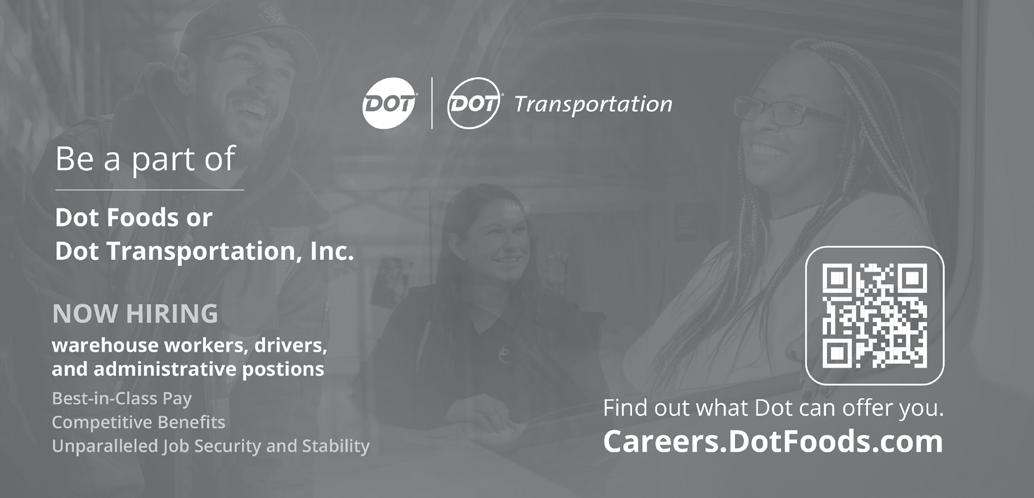

Not so long ago, job interviews were conducted almost exclusively in person. Hiring managers were able to assess candidates during these interviews, getting an idea about everything from the applicant’s skill set to how he or she affected the energy in the room to body language and the confidence of a handshake. Today a growing number of interviews are virtual. Many are conducted via popular video conferencing apps like Zoom. In a recent survey of talent leaders and recruiters conducted by the tech firm Talview, 80 percent of respondents said their hiring process is now fully remote. There are many advantages to remote/virtual interviews. They tend to be more convenient for screening applicants for remote positions because the applicant pool may be coming from anywhere around the world. Remote interviews also can be less time-consuming. As useful as they can be, remote interviews are not foolproof. Technical snarls or uncooperative conditions at home can affect remote interviews. Virtual interviews
also may not give candidates an accurate idea of the culture at a given firm. But remote interviews are likely here to stay, so here’s how candidates can put their best (virtual) foot forward.
Test the technology
Open the conferencing app and test links to make sure that you can get on the service and understand how it functions. Log in early, even if it means sitting in a virtual waiting room until the meeting organizer arrives. At least you’ll be ensured of being on time.
Have a cheat sheet at the ready
A remote interview gives candidates a distinct advantage, as they can utilize notes without it being obvious. Place them just above the device camera or off to the side slightly so you can refer to them like one may read a teleprompter or cue cards on television.
Use your space wisely
If you’ll be on video, set up your space and your appearance so that it is professional but engaging. Use your home office
environment to make a strong impression. Keep background clutter to a minimum. If necessary, use a virtual office backdrop, which was preferred by 97 percent of the 513 recruiters that Harvard Business Review observed and interviewed over an eight-month period in 2020.
Engage with the interviewer and avoid distractions
Distractions can knock you off of your game and make you come across as less engaging to recruiters. Ask housemates to make themselves scarce during the interview and lock pets out of the room. Silence your phone (if it isn’t the device being used for the interview) and look into the camera while speaking. Maintaining eye contact is a sign of respect and confidence. If the interviewer is speaking at length, utilize the mute button on your phone or conferencing app to silence ambient noise.
Remote interviews are a large part of modern working environments. Mastering an ability to interview remotely can help candidates ace their next interview.


The luxury of working near a big city or center of industry is not shared by everyone. Even though remote working has become more acceptable in recent years, many firms still want employees to come into an office. This begs the question of whether individuals should consider relocating when looking for a new job. It’s a personal decision, and one that has the potential to affect professionals’ lives in many ways. Individuals can consider these factors before applying for jobs that might require them to relocate.
Relocation expenses
It is important to weigh the benefits of a new job with the expenses related to relocation. It may take some time to recover lost funds associated with moving, and you might not want to put your financial stability in jeopardy. Some companies are willing to offer relocation services or a moving stipend. Check with the hiring manager to see what, if anything, is offered. Assistance also may extend to helping a
spouse find a new job or helping you to sell or rent an existing residence.
Think about career growth
Figure out where you see your career going in the future. Is this job a good stepping stone to other opportunities or one that will be your final job? If so, it could be worth the time, expense and effort to relocate. But if you’re moving only for salary and will not get much more out of the deal, like access to more connections or more challenging responsibilities, you may want to pass.
Building your network
Relocation requires building new networks, including social networks and networks of professional associates and service providers. When considering relocation, look to areas where you already have a networking touchstone, such as a former college pal or even a friend or family member. All you need
is one person to start the ripple effect of getting to know others. This may be easier than starting from scratch in a town where you know no one.
Learn about the location
While every facet of a job may look good on paper, how does the location measure up? You may need to do a little market research to find out if a city, town or even country is on an upswing or in decline. Do you want to move to an area that has a high number of people moving out? Are there amenities you desire, such as museums, parks or good schools? How are real estate values and job security? Look beyond the company and the offer to the bigger picture, as you’ll only be spending so much time on the job and the rest enjoying life.
The potential to relocate for job requires professionals carefully consider a host of factors before committing to a move.

Job searches are often described as akin to looking for a needle in a haystack. That could be even more so in the digital age, an era when online job boards feature hundreds, if not thousands, of listings. Sifting through those listings can be time-consuming and force job seekers to wonder if their résumé will even be seen.
Conventional wisdom regarding résumés may no longer apply. A résumé can still be a useful asset, but job seekers must recognize the game has changed, specifically in regard to how résumé submissions are received and reviewed. Many companies now use applicant tracking systems (ATS) to sift through résumé submissions before they ever land in the inbox or on the desk of an actual human being. Because ATS is so popular, job seekers would be wise to embrace strategies to make their résumé more ATS-friendly to increase the chances the document finds its way to a hiring manager.
The right keywords can help get a résumé seen. Though a résumé was once viewed as a tool that allowed job seekers to illustrate how they were unique from other applicants, uniqueness on a résumé may now be a detriment. ATS serve as virtual gatekeepers that scan documents submitted for job openings. If those documents don’t feature certain keywords, they’re likely to be relegated to the virtual scrap heap. Professionals should research which keywords are likely to get their résumé past the first stage of the hiring process and include them in the body of the document.
There’s more to it than keywords. Though the right keywords can ensure a résumé gets past the virtual
gatekeepers, they’re not the only features of a good résumé. ATS are programmed to read résumés that are formatted in certain ways. The experts at Jobscan note that the most ATS-friendly résumé is one that is chronological. That’s something most job seekers are already familiar with, as professionals have long listed their professional experience in reverse chronological order. That approach still works, and Jobscan recommends including company name and location, job title, start and end dates, and achievements and responsibilities for each job listed in the work experience section.
Avoid unique formats. Résumé data included in graphs, tables and columns might seem invaluable, but ATS software might make a mess of it. In addition, maintain a uniform font throughout the document. Sans serif fonts like Calibri and Helvetica won’t be difficult for ATS programs to read, increasing the likelihood that the document will ultimately be seen by a hiring manager. Make the résumé mobile-friendly. A résumé that is easily opened and read on a mobile phone is likely to be just as easily read in an ATS program. Professionals can design their résumés and then open the documents on their phones. Documents that open quickly and easily are probably formatted in an ATS-friendly way, while those that don’t may need to be simplified and reformatted. In the age of digital job-seeking, professionals can take steps to make their résumés ATS-friendly to ensure the documents are ultimately seen.

Awell-edited résumé can go a long way toward helping job candidates make a strong first impression with hiring managers. A recent survey of hiring managers and human resource professionals across companies of various sizes and in an assortment of industries conducted on behalf of CareerBuilder found that certain mistakes were deal breakers for a large percentage of individuals tasked with helping to find new hires. Seventy-seven percent of hiring managers indicated typos or bad grammar on a résumé were enough to disqualify a candidate from consideration. An unprofessional email address (35 percent) and a résumé with long paragraphs of text (25 percent) are some additional mistakes that hiring managers consider deal breakers. This information can prove useful for job seekers, who should know that 39 percent of hiring managers indicated they spend less than a minute looking at a résumé. That brief chance to make an impression should not be undermined by preventable blunders like typos and poor grammar.

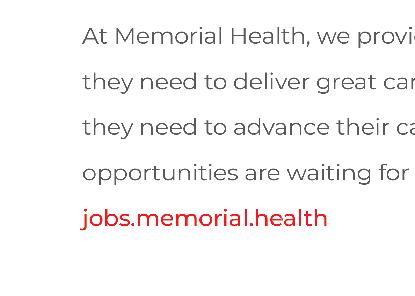


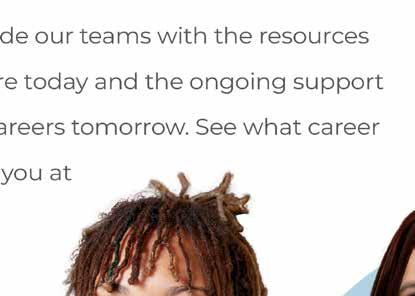






Memorial Health is committed to supporting the next generation of healthcare professionals— in Jacksonville and beyond. Whether you’re just beginning your career in healthcare or looking for new opportunities to make an impact in your community, we offer a wide range of positions to help you succeed.
Memorial Health offers a wide variety of career opportunities in both clinical and nonclinical roles. Whether you’re interested in nursing, imaging, lab sciences, respiratory therapy, behavioral health, IT, finance or administration, you’ll find meaningful work that makes a difference in the lives of patients and our communities. We’re hiring for every background and experience level.
We invest in the well-being of our colleagues through a wide range of physical, mental and financial benefit programs. In additional to competitive pay, you’ll also enjoy excellent retirement benefits, generous paid time off, tuition assistance, career development programs and a supportive team environment that values your growth.
Memorial Health is rated one of the best places to work in central Illinois. We create an environment where every team member is respected, supported and empowered to provide excellent care. This commitment has earned us Magnet® and Pathway to Excellence® designations, as well as many more recognitions.
Memorial Health is a leading healthcare provider in central Illinois, offering career opportunities at every stage of your professional journey. With multiple facilities across the region, we offer a chance to work in a wide variety of care settings. There are also many ways to grow within our organization, with access to continuing education and advanced training opportunities.

Quitting a job might never seem like the best option for established professionals, but it’s a route that was taken by an incredibly high number of workers in recent years. According to the Job Openings and Labor Turnover Survey from the U.S. Bureau of Labor Statistics, 50.5 million people quit their jobs in 2022. Improved job prospects undoubtedly contributed to that high turnover, but professionals who left their jobs without another one already lined up may need some help finding their next gig.
Significant layoffs in the early months of 2023 coupled with tens of millions of individuals leaving their jobs voluntarily in 2022 could potentially make the competition for new jobs more competitive. Professionals confronting that situation can consider these tips as they seek to master the art of modern job hunting.
• Use LinkedIn to your advantage. The professional social media platform LinkedIn is an invaluable resource, especially for professionals looking for a new job. Even professionals who are still working but hoping to land a new job can utilize LinkedIn to their advantage, as many recruiters embrace the strategy
of passive recruiting, which involves scouring LinkedIn for professionals who are not actively looking for a new job but might be interested if the right opportunity presents itself. Professionals who aren’t already on LinkedIn should join and create a profile that highlights their experience and skills. Workers who are already on LinkedIn can periodically update their profiles and use the platform to stay up-to-date on the latest trends in their industries.
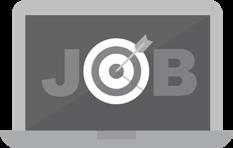
• Create a portfolio of your work. Landing an interview may be the first goal, but professionals also must be ready to master that interview should the opportunity arise. A portfolio that showcases past work and accomplishments can help candidates present themselves in the best light possible. Utilize a free or inexpensive service like WordPress that hiring managers and others can visit quickly and easily to see your work.
know that standing out in a crowded field of applicants has long been a challenge when seeking a new job. But that challenge grew significantly more difficult in the internet era, when it became vastly easier and quicker to apply for a new opportunity but simultaneously more difficult to stand out from the many other applicants who could apply in a few minutes or less.
• Identify who you want to work for. Experienced professionals who are still working may have the luxury of patience when beginning their job search. That luxury ensures professionals can wait for opportunities at companies they want to work for. Targeting specific companies can take some of the frustration out of modern job hunting, which often requires scouring a seemingly endless string of job openings. Out-of-work professionals can still target specific firms, but they also can utilize down time to research other organizations in an effort to widen and expedite their search.
• Work with a recruitment agency. Much like job seekers grow frustrated at sifting through job postings, organizations may not have the will or the resources to devote to finding worthy candidates for their openings. That’s why organizations often turn to recruitment professionals, who do the leg work when companies are looking to hire new people. Recruitment professionals earn their money from the companies doing the hiring, not the person getting hired. So there’s no downside to utilizing recruiting professionals in your search.
Modern job hunting can be difficult. But various strategies can help talented professionals land rewarding jobs.
The modern job market certainly requires a different approach to finding a job than in years past. However, some useful points can help talented professionals find their next job.
• Hone your networking skills. Networking is a vital skill for modern professionals, including those looking for a new job. Though internet reports suggest as much as 85 percent of job openings are now filled through networking, that data has been debunked and characterized as a myth. Still, networking can help professionals learn about openings before they’re listed (if they’re even listed at all) and also provide insight into a company’s culture.
• Create a visible online profile.
LinkedIn was long considered the go-to platform for professionals to establish an online profile, and that’s largely still the case. Though some LinkedIn users complain that jobs advertised on the site are not removed even weeks after they’ve been filled and others feel the

site has become a more traditional social networking site and less a professional networking platform in recent years, it’s still a go-to platform among human resources professionals and recruiters. In fact, a recent report from Jobvite found that 87 percent of recruiters utilize LinkedIn to identify candidates. So while some may view LinkedIn as less useful than it used to be, HR professionals continue to value it.
• Create an informative online profile.
It’s important to have an online profile in the modern professional world and equally vital to make that profile as informative as possible. Avoid lengthy sentences that HR professionals and others are unlikely to read in favor of bullet points of relevant experiences and skills. It’s possible to be both concise
and informative, and professionals should aspire to be both when crafting their online profile.
• Keep looking. Though it’s hard to confirm various online claims regarding how many applications the average job seeker submits before landing a new job, various sources indicate a person can expect to apply for as many as 200 jobs before successfully finding new work. That’s a lot of leg work and frustration, but it’s vital that professionals avoid waving the white flag. A new opportunity will eventually arise, particularly for those who fully commit to finding a new job.
The modern job market can be difficult to navigate. But diligent and dedicated professionals who commit to the process can land a fulfilling job.


Interviews are an integral component of the hiring process. According to Zippia, the average corporate job opening garners 250 résumés. Among those, only four to six people are likely to be interviewed.
With such competition for jobs, landing an interview is an opportunity to be cherished. Furthermore, candidates should do their best to ensure interviews go as smoothly and effectively as possible. Nerves can derail an interview. Nervous energy is a byproduct of humans’ “flight or fight” response in stressful situations. Adrenaline builds up in the body and that can make for a nervous interview. The following anxiety-taming tips can help anyone remain calm, cool and collected during an interview.
1. Laugh out loud. Humor can diffuse nervous feelings. Rather than stewing on the upcoming interview, watch a funny movie or listen to some standup comedy to help you laugh and lighten up.
2. Leave plenty of time for travel. Anxiety can creep in if you’re running late for an interview. Leave plenty of time to get there when interviewing in person. You don’t want to stroll in sweaty and out of breath because you just ran from the subway station or parking lot. For remote interviews, ensure that meeting links are working properly and that you understand how to use the conferencing application in advance of the interview.
3. Be prepared. Prepare for the interview and conduct a trial run with a friend or family member. Research commonly asked interview questions but be prepared to answer more job-specific queries as well. Preparation can help you feel less nervous and more in control.
4. Clear your mind. Figure out which relaxation method works for you and employ it. Some find taking a short stroll outside enjoying nature clears their mind, while others prefer deep breathing and meditation. Some people may feel more relaxed
after an exercise session. Build these coping mechanisms into your schedule on the day of an interview.
5. Change your perception. An interview is a conversation and not an interrogation. Certainly you are selling yourself to the recruiter, but the company also has to sell itself to you. Interviews are two-way streets to determine if the employer-employee dynamic is the right fit. Remembering that you are on somewhat equal footing can make the interview less nerve-wracking.
6. Make small talk. While waiting to be called into the interview, speak with others, such as the receptionist, other employees walking by or even people in the elevator. Small conversations can shift your focus from internal thoughts to external stimuli.
Job interviews can drum up nerves, but there are strategies to help candidates overcome their nerves.
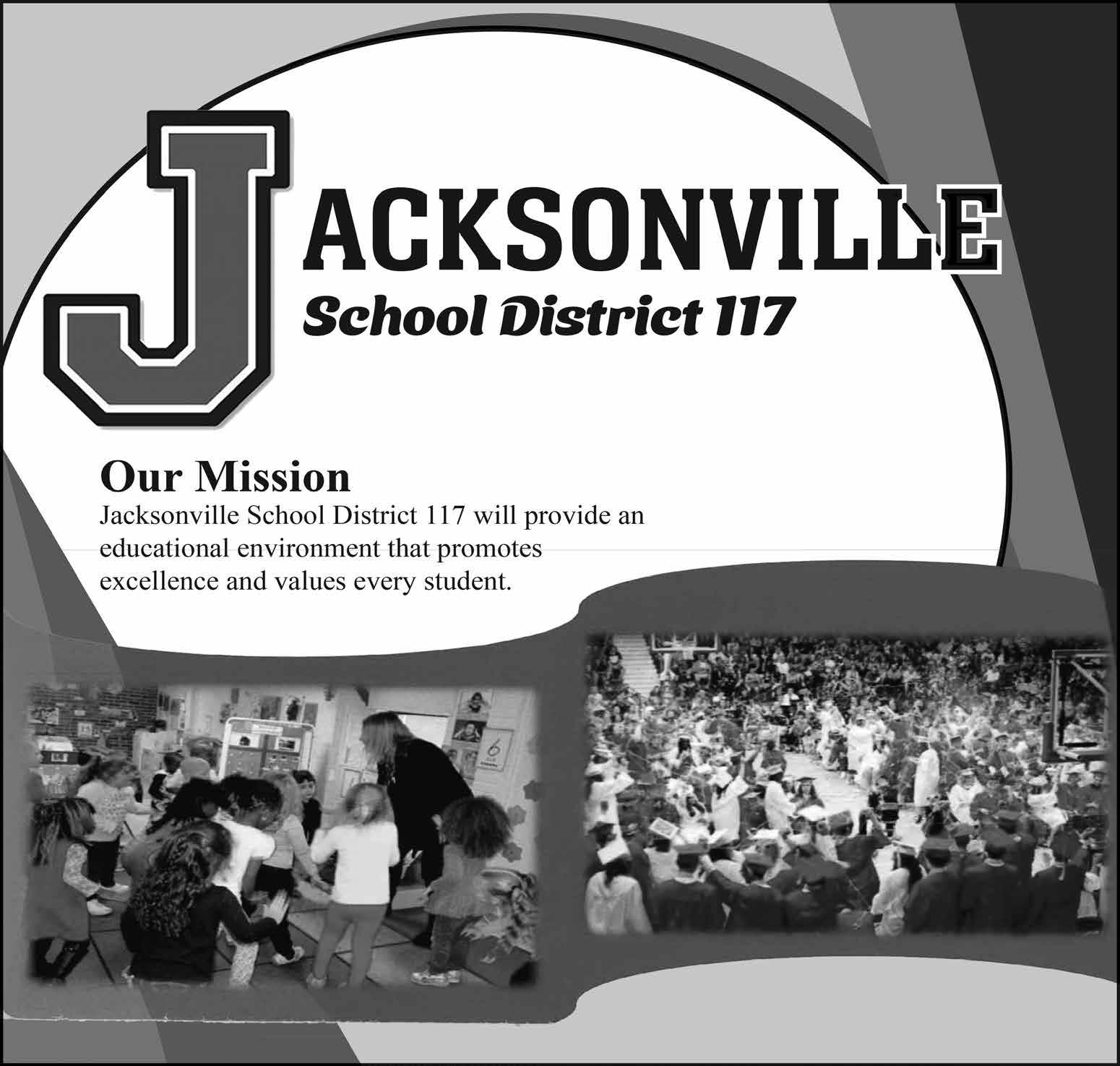
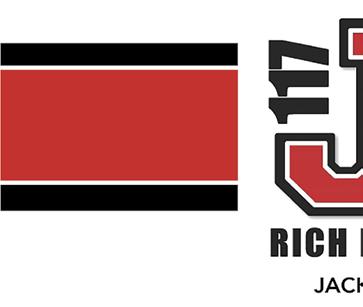
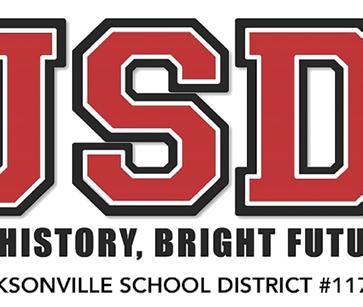
Elementary Special Education Teacher (4 positions)
Social Worker
Elementary ELL Teacher and Middle School/High School ELL Teachers
Special Education Teacher at Jacksonville Middle School (6 positions)
Special Education Teacher at Jacksonville High School (4 positions)
Science Teacher at Jacksonville Middle School and Jacksonville High School
Pre-K Teacher
Physical Education Teacher at Jacksonville High School

Paraprofessionals
Bus Drivers
Bus Monitors
Food Service Worker
Teachers: $125 per day for rst 19 days – then $150 per day
Paraprofessionals: $112.50 per day
LPN Paraprofessionals: $20 per hour
Custodians: $17.00 per hour
Secretaries: $15.00 per hour
Nurses: $25.00 per hour
Food Service: $15.00 per hour